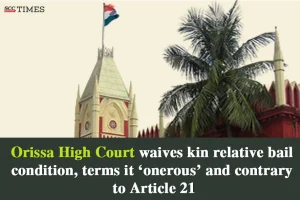Orissa High Court: In the present application, the petitioner challenged the condition imposed by the Sessions Judge while granting him bail, wherein one of the sureties was required to be a kin relative of the accused. Despite being granted bail, the petitioner remained in custody since 29-04-2025 due to his inability to furnish such a surety. A Single Judge Bench of G. Satapathy, J., while allowing the application observed that the condition was not only onerous but also operated as an impediment to the petitioner’s release. The Court emphasised that the right to personal liberty was a constitutional mandate under Article 21 of the Constitution, and detention must strictly follow the procedure established by law.
Analysis:
The Court noted that while there was no statutory provision regulating the imposition of conditions in bail orders, any such condition had to be reasonable and aimed solely at securing the attendance of the petitioner at the trial. The Court highlighted that the insistence on a kin-relative surety, especially when the Court had already imposed a condition to furnish two sureties, was unnecessary. Even if such a condition was imposed, it ought to have been waived when the petitioner could not furnish the surety despite being granted bail.
The Court referred to the decision in Moti Ram v. State of Madhya Pradesh, (1978) 4 SCC 47, where the Supreme Court held that “India was one and not a conglomeration of districts, untouchably apart” and therefore, seeking a condition which was not strictly in terms of the mandate of law would be highly unacceptable.
The Court highlighted that the underlying principle in imposing conditions while granting bail was that excessive bail was no bail, since bail provisions were enacted to prevent detention of accused pending adjudication, as pre-trial punishment, given that the accused was presumed innocent until proven guilty. The Court noted that imposing onerous conditions amounted to denial of bail, as conditions were meant to ensure attendance at trial, but imposing a condition that was excessive or impossible to comply with was never the intention of the legislature.
The Court emphasised that once bail was granted, imposing such conditions frustrated the Court’s intention and violated personal liberty under Article 21 of the Constitution. The Court further noted that excessive and onerous conditions depended on the facts and capacity of the accused, and if the accused was unable to comply, the Court had to aid by modifying or relaxing bail conditions.
The Court relied on Policy Strategy for Grant of Bail, In re, (2024) 10 SCC 685, where it was observed that if the bail bonds were not furnished within one month from the date of grant of bail, the concerned Court might suo moto take up the case and consider whether the conditions of bail required modification/relaxation. The Court further referred to Ramchandra Thangappan Aachari v. State of Maharashtra, 2024 SCC Online SC 2629, wherein it was held that it would be a travesty of justice if the petitioner were unable to secure the benefit of the bail order due to his inability to furnish local surety, since this would infringe the rights guaranteed under Article 21 of the Constitution for the person who continued to be detained despite a bail order in his favour.
Decision:
In the present case, the Court found that due to the condition imposed by the Trial Court, requiring one of the sureties to be a kin relative, the petitioner was unable to secure his release from jail custody and had remained incarcerated since 29-04-2025. The Court observed that it had been repeatedly held that bail was the rule and jail was the exception, and that an accused must be presumed innocent until proven guilty at trial. The Court emphasised that it must not treat any person as guilty unless the charge was established beyond reasonable doubt.
In view of the factual circumstances and the legal precedents cited, the Court considered it just and proper to allow the application by waiving the condition requiring a kin-relative surety, especially since the petitioner continued to remain in custody despite being granted bail. Accordingly, the condition stating “out of the two sureties, one surety must be a kin relative of the accused” was waived, the remaining part of the bail order was left unaltered, and the application stood disposed of.
[Harsha C v. State of Orissa, 2025 SCC OnLine Ori 3377, decided on 03-09-2025]
Advocates who appeared in this case:
For the Petitioner: D. Mund, Advocate
For the Opposite Party: C. Mohanty, Addl. PP


